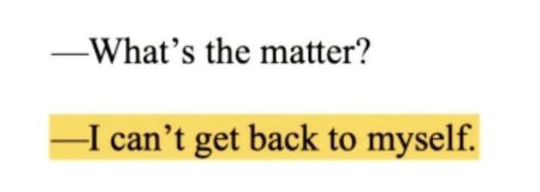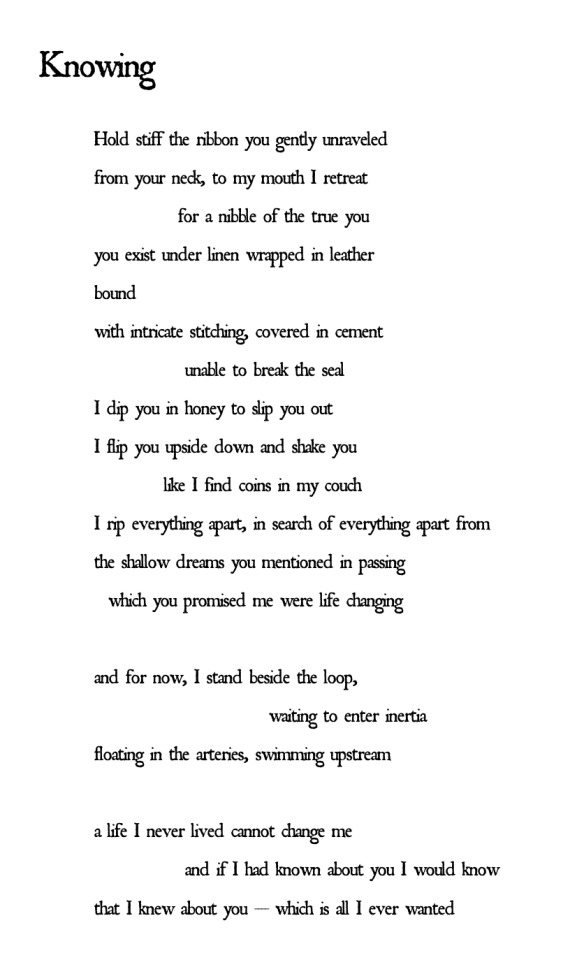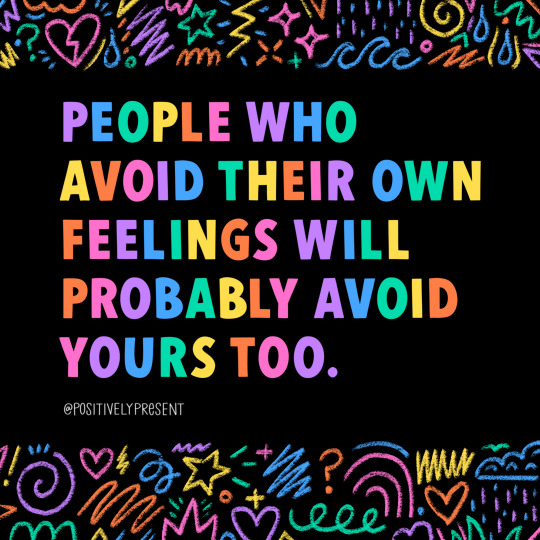#avoidance
Explore tagged Tumblr posts
Text
They called it “just a comment"
I called it
three weeks of anxiety, five skipped shifts, and a therapist
I couldn’t afford
#toxic work culture#harassment#shitty job#invisible#power of words#verbal abuse#sticks and stones#avoidance#should i quit#work trauma#trauma recovery#seeds of suffering#aftermetoo
187 notes
·
View notes
Text
I am the easiest person to get rid of. You can imply once that you don't want me around and you'll never see me again. Call me annoying once, I'm gone. Be mean to me once and I will get out of your life promptly. Look at me the wrong way and I am a ghost. The fear of being a burden will have me erase myself before staying where I'm not wanted.
#abandonment issues#attachment issues#avoidance#trauma inflicted avoidance#disappearing from peoples lives#the second you feel they might not want you there
1K notes
·
View notes
Text










louise glück, the white series // claude monet, houses in the snow // fyodor dostoyevsky, the gentle spirit // jane o. wayne, with solitude //reddit user artsykate, winter nocturne with lonely road // joseph brodsky, to m.b. // fyodor dostoevsky, poor folk // caspar david friedrich, winter landscape // audre lorde, the cancer journals // mahmoud darwish, memory for forgetfulness
#on isolation#on loneliness#on isolating#on self sabotage#web weaving#web weave#poetry#poetry collage#dark academia#winter#on depression#dark art#poetry collection#poetry compilation#avoidance#actually avoidant#avoidant attachment#fearful avoidant#mine
2K notes
·
View notes
Text

Jeanette Winterson, from The PowerBook
[Text ID: “To avoid discovery I stay on the run. To discover things for myself I stay on the run.”]
#jeanette winterson#running#freedom#discovery#adventure#avoidance#excerpts#writings#literature#prose#fragments#selections#words#quotes#typography#prose collection
241 notes
·
View notes
Text
Me: I desperately want to finish writing my book. More than anything. More than I want coffee, sleep, food, or socializing.
Them: shouldn't you be working on it then?
Me *pausing while reorganizing my fridge*: how dare you!
#writing#books#writersnetwork#writers#writers on tumblr#writing community#writerscommunity#author#writers life#authors of tumblr#tumblr writing community#writing is hard#writing process#writer#writer problems#writer things#writers of tumblr#avoidance#unknown quote
232 notes
·
View notes
Text
Sometimes when people say they "can't give you what you need", they mean they won't— they don't care enough to.
#relationships#communication#miscommunication#thoughts#feelings#needs#healthy relationships#unhealthy relationships#toxic relationships#unrequited love#unrequited feelings#unrequited relationships#mental health#effort#low effort#bare minimum#bare minimum relationships#unbalanced relationships#power imbalance#emotional unavailability#emotional#avoidant attachment#fearful avoidant#avoidance#anxious avoidant#actually avoidant#disorganized attachment#dismissive avoidant#anxious attachment#draining
167 notes
·
View notes
Text

knowing
55 notes
·
View notes
Text

Something to think about!
#positivelypresent#feel your feelings#feeling stuck#relationships#quotes#avoidant attachment#avoidance#face yourself
142 notes
·
View notes
Text
Texting in theory: communication with friends! So fun! Memes! Talk talk talk! ❤️✨
Texting in practice: Oh god I don't have the energy to reply right now, I'm currently in Task Mode not Talk Mode so there is currently no battery allocated for socializing atm. Oh it's been too long, do they think I hate them? If I reply will I have to stay engaged in conversation for a few seconds? Half an hour? How long will this conversation be? When is it okay to step away and do something else? Will they think I hate them if I go too long without responding again? I don't hate them, I love them, I need to figure out how to do this. What tone did they intend this in? How do I ask what tone they meant without coming across as rude? How can I respond in a way that cannot possibly be construed as passive aggressive/rude/dismissive? I want to stay engaged with the task I'm doing, I don't want to go back and forth and back and forth and back and forth. I really really enjoy it when I'm in the right "Mode" but each notification feels like an obligation. Why does this feel like a chore? I like talking to my friends, why doesn't it feel like talking to my friends? Why do I feel trapped? Why do I avoid people I love? Oftentimes I'm not even "doing" anything when I don't respond, I'm just in "non social" mode. Even if I know I'll enjoy talking once I get started every unopened message feels like a burden. I shouldn't see texts from people I love this way, I should be happy, they want to talk to me and they love me. Why can't I just be normal about this, why can't I stop avoiding every damn thing?
#i'm too autistic for this#I hate that i do this!!! people love me and want to talk to me!!! i wish I wanted to text!!!#i don't!!!#and phone calls also suck??? i feel trapped for some reason???#how do i get over this this has been a problem since i got a phone on hs forever ago lmao#actually autistic#autistic#autism#autism help#text anxiety#texting anxiety#social anxiety#i hate that i ignore things#actually avoidant#i think i may have avpd??? idk tho#i have avoidant traits#but idk if it's enough to actually get dx'd#avoidance#avoidant attachment#avoidance issues#avpd#possibly avpd#questioning avpd#even if I'm not fully avpd i think that there's enough overlap that avpd tools may help????#idfk#i hate being perceived but i want it more than anything#fear of being known
109 notes
·
View notes
Text
Vorbis turned his head slightly, looking sidelong at Brutha as if he was trying to hide behind his own face.
Terry Pratchett, Small Gods
#vorbis#brutha#small gods#discworld#terry pratchett#character description#nonverbal communication#avoidance#enemies#guilty#perception#tension#psychology#people watching#hiding#hiding behind himself#sidelong
71 notes
·
View notes
Text
My sassy PDA be like...

#pda autism#pda#pathological demand avoidance#autism memes#autistic memes#neurodivergent memes#cat memes#memes#adhd memes#autistic experiences#neurospicy#autistic things#autistic culture#demand avoidance#autism#actually austistic#autism spectrum disorder#funny art#nuerodivergent#autistic#actually autistic#autistic adult#sassy#defiance#avoidance#persistent drive for autonomy#personal autonomy#neurodiverse stuff#autismjourney#autism things
85 notes
·
View notes
Text
Avoidant choices a character could make
Ghosting someone to avoid a difficult conversation
Leaving an event early to avoid emotional intimacy or a confrontation
Refusing to apply for a job because the failure would be too much
Suppressing emotions, even in private
Overworking
Ending a relationship suddenly instead of working through conflict
Decisions that have dangerous consequences
Ignoring a threatening message, leading to them or someone else getting hurt (either out of fear, or a belief that the person being threatened deserves it)
Refusing to get medical attention out of fear (medical trauma my beloved)
Failing to warn others about an impending threat
Failing to testify in court out of fear, resulting in a criminal going free.
Avoiding checking on a loved one after a worrying message
Motivations
Avoiding fear/discomfort
Don’t believe their actions matter
Prioritise personal comfort
Overconfidence in others handling it
Denial as self-preservation
Laziness
Desire to let things unravel/watch the world burn
Believes people should handle things themselves
Revenge/schadenfrude
Potential negative consequences of confronting bad situations/feelings
A violent and intense argument is caused which results in a relationship ending anyway
Embarrassment
Losing their sense of control
Emotional vulnerability is met with contempt and weaponisation by others
Dragged into a dangerous situation
The experience the character is avoiding actually traumatises them further
Potential of horrific discovery
Intense anger over the fear felt by vulnerability/confronting trauma
Have fun with ts 🔥🔥🔥
#flawed characters#avoidance#writing#writers on tumblr#writerscommunity#problematic faves#writing tips#character advice#writeblr#writing advice#ao3
48 notes
·
View notes
Text

#avoidant personality disorder#avoidant attachment#avoidance#do the work#grind#hustle#work#work hard#hard work#stop procrastinating#procrastination#work harder#work in progress#go hard#focus#tumblr#mission#progression#progress#grinding#new levels#no excuses#excuses#stay focus#stay focused#let’s get it#let’s work#vision#visionary#elevate
35 notes
·
View notes
Text
. . . the feeling was so intense that he just said, 'Bye!' and ran away.
Lev Grossman, from The Bright Sword
#avoidant attachment#intense#avoidance#running away#overwhelmed#avoidant attachment style#relationship dynamics#fear of intimacy#quotes#lit#words#excerpts#quote#literature#goodbye#lev grossman#the bright sword
75 notes
·
View notes
